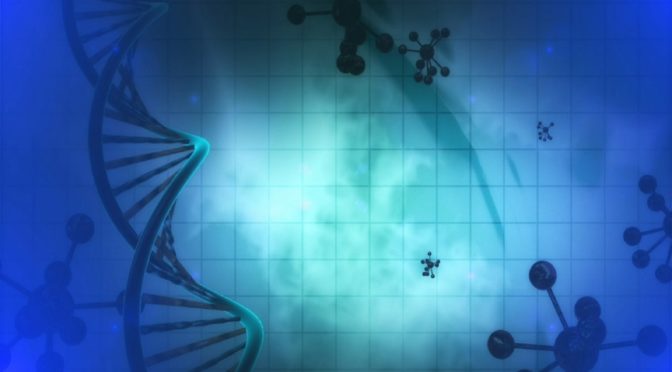Author: Daniel Rash (Biohackingdan/Geneticwarrior)
With new books and research being released each day stating which diet is the, “optimal” diet for human species, it can be quite confusing what to fill your plate up with nowadays. Is going ketogenetic the right move? What about paleo? Maybe I should go vegetarian or vegan after watching that latest documentary? I could probably write a whole paper on the different diet options that have been touted as, the best. The hard truth is that many of these so called, “health gurus” are simply trying to end up on the best seller’s section of the book store. With the thousands of nutrition and recipe books written within the last 20 years, you would think we would have the health crisis under control regarding obesity, weight loss, hormone health, mood disorders, however, this is not the case.
Recent research centered around the school of Epigenetics, which can be translated to, “the study of changes in organisms caused by modification of gene expression rather than alteration of the DNA”, has given us an alternative perspective on how to view diet and lifestyle changes. It has shown us that our daily choices whether it be through our contact with environment, supplementation or our diet, dramatically affect the expression of our genes and can be tailored to optimize genetic and enzymatic function based on our genetic predispositions. This is contrary to the previous common belief that we are destined by our genes and have no control over them. Well I am here to tell you that you are the engineer of your genetic expression, whether you like it or not. By understanding your genotype, you can make the appropriate dietary modifications necessary to alter your genetic expression and be well on your way to optimizing your genetics and human potential.
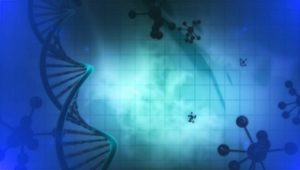
THE FUNDAMENTAL FUNCTION OF GENES (For all of my fellow biology nerds)
The main function of a gene is simply to create proteins or amino acids. Genes can be defined as, “a segment of DNA on a chromosome that describes how to make a certain protein.” To quote the great Bruce Lipton, ““Epigenetic control reveals that environmental information alters the readout of the genes without changing the underlying DNA sequenced code…From a single gene, epigenetic regulation can provide for 30 thousand different variations of expression (Genetics, Epigenetics, and Destiny).” Now without going too in depth regarding the mechanisms of genes, the overall function or expression is dependent on a few mechanisms.
The first mechanism is transcription, in which the messenger RNA (mRNA) makes and sends a copy of the DNA from the nucleus of a cell to the cytoplasm, specifically the ribosome in which proteins are formed. As the mRNA goes to the ribosomes, it has to wait for its matching amino acid sequence which is delivered by its friends, transfer RNAs (tRNAs). Once the matching amino acid sequence is delivered, the second mechanism called, translation can happen, forming the Polypeptide and finally, the protein structure. After the proteins are translated, they go through a series of modifications which helps mediate multiple functions such as, folding, stability, activation/inactivation, markers and functions. As you may guess, this where transcription/translation errors may occur, creating an improper amino acid sequence or mismatch. When this happens, this can affect the functionality of a particular gene and result in an array of effects described below. Simply put, proteins are in charge of doing most of the work in cells.
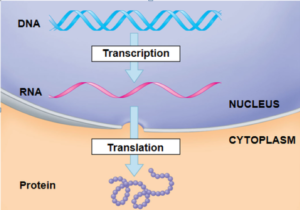
SO WHAT MAKES US DIFFERENT (Still technical, see next section if head starts hurting)
While we may all look and act different, technically our human genomes are mostly 99% identical. This means that the remaining one percent, can be a major contributing factor on expression of health and disease states and can be defined as, “true mutations”. These differences are also called Haplotypes, which are usually a Cluster of SNPS that are inherited together. A SNP or Single Nucleotide Polymorphism is a variation in a single nucleotide that occurs at a specific position in the genome, where each variation is presentation to some degree within a population (e.g.>1%). Now these are extremely common in that an average human genome contains up to 10 million of these SNP variants in which sometimes (not always) will alter the amino acid sequence in a protein, changing its function and expression.
These variations or altered amino acid sequences can result in harmless variations such as eye or hair color, to more impactful variations that affect detoxification, methylation/acetylation (turning genes on and off), as well as conditions such as Cystic Fibrosis, Sickle Cell Anemia, Huntington Disease, etc. Now of the later diseases listed, these are actually true mutations, in the sense that these occur within less than 1% and are lower frequency genetic changes. We are instead going to be focusing specifically on SNPs that occur in >1% of the population.
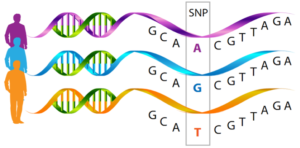
ADRESSING SNPs THROUGH EPIGENETICS & ENVIRONMENTAL FACTORS
In summary, we are all born with a genetic blueprint, that is inherited through each of our parents. This blueprint contains millions of variations or SNPS that can contribute to the functionality of certain genes or enzymes. These can be seen as our tendencies or predispositions and can influence our physical, mental, and emotional states. While we may have these certain tendencies/predispositions, the basis of Epigenetics teaches us that our genes are influenced and/or modified by many factors we come into contact with our environment.
Now that we have the science behind us, I want to focus specifically on how we can address certain genetic variations through Epigenetics. As we have learned, the environment is the biggest determining factor on how your genes express themselves. So, we are going be focusing on that.
So, what classifies as an environmental factor? Everything you ingest through your 5 senses, whether it be your thoughts/beliefs, life experiences or the food and supplements your taking on a day to day basis. In this post we will be focusing specifically on nutrition and how a precisely prescribed nutrition plan can dramatically address many genetics variants while a generalized diet may be what is holding you back. Time to take out the pen and paper.
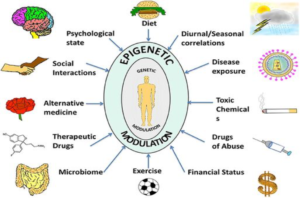
FIGURING OUT THE BEST DIET FOR YOU
The study of how nutrients (either from food or supplementation) can alter genetic expression is called, Nutrigenomics. This growing field of science has given us detailed information on how certain nutrients influence our genetic expression based on our specific biochemistry. Now the benefits of understanding your own biochemistry either through genetic testing and/or lab testing can help you understand exactly what kinds of foods/nutrients you need to be consuming on a day to day basis, and which ones to avoid.
Rather than following the next fad diet in hopes to lose those extra pounds or pack on some lean muscle, eating according to your individual genotype can allow you to tailor your diet precisely to your genetic variants or predispositions and thus, optimizing your genetic expression.
As low carbohydrate diet plans such as the Ketogenic diet begin to become popularized, many people are claiming to have more energy, decreased appetite and subsequently, weight loss. While a Ketogenic may be right for some, this doesn’t imply that it is right for everyone. One common SNP or genetic variant related to optimal carbohydrate intake is called the Perilipin gene or PLIN1. Genome wide association studies examining subject’s response to different macronutrient variations had shown that when subjects with the GG genotype consumed <144g of complex carbohydrates, their waist circumference decreased, however, when subjects with the AA genotype consumed the same carbohydrate meal plan, their waist circumference increased (J. R Ruiz, et al.). As this study implies, some people with certain genetic factors do better on a low carbohydrate diet, while some do better with higher carbohydrates (>250g).

As people start chowing down on 3 ribeye steaks a day, participating in the `Carnivore diet’, many are finding remission in autoimmune disorders, better G.I. function, more energy, etc. As someone who loves red meat as much as the next guy, there are some key genetic factors that we need to acknowledge moving forward. Our ability to metabolize fat and create homeostasis between triglycerides and cholesterol is largely dependent on a gene called, APOE. This gene called, Apolipoprotein E is responsible for synthesizing a protein by combing with fat and forming a lipoprotein. The main role of these lipoproteins in the body is to carry fats in the bloodstream from one tissue/cell type to another. As you may have guessed, people with genetic variants on this gene can impact cholesterol metabolism, atherosclerosis, cardiovascular disease and dementia risk.
Studies have shown that people who consumed a high saturated fat diet that carried the 4/4 genotype of this gene, were 7 times more likely to develop Alzheimer’s disease than a non-carrier who ate the least amount of saturated fats (APOE4, Diet and Alzheimer’s Disease: Explained in Human Terms). People who carried the 3/4 and 4/4 showed a 42% increased risk of cardiovascular disease (CVD) compared to E1/E1 carriers. So, before you throw that dab of grass-fed butter on your daily steak, know your APOE status first.

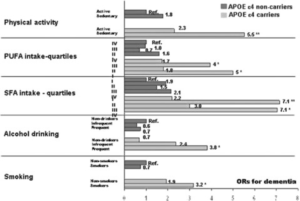
Ok, so what about a vegan diet? Did somebody say vegetable juicing and smoothies every day? That definitely will detox my body and make me feel like incredible. It may, or it may not. Recent research regarding a gene named, ABCG8, or otherwise known as the, “Anti-Vegetarian Gene” has been shown to drastically affect plant metabolism. It is specifically in charge of removing plant sterols from the body, which are fatty components of plant-based foods that cannot be used by human cells. These usually are escorted out of the body through the liver/bile no problem, however, people with genetic variants may have a harder time excreting these non-usable sterolin proteins and can actually cause increased triglycerides and lipid markers. People carrying genetic variants related to Lectin (carbohydrate binding protein) absorption and Oxalate metabolism in plants cause also be subject to inflammatory responses from a plant-based diet.
Another contributing factor can be methylation status. Without going to in depth regarding the mechanisms of methylation, a methyl group (one carbon atom bonded to three hydrogen atoms) when attached to DNA can dramatically change the DNA segment, silencing gene expression and possibly repressing transcription. One of the key nutrients in vegetables, specifically leafy green vegetables is called, Folate (Vitamin B9) plays a significant role in methylation, detoxification, neurotransmitter regulation, etc. If you have been anywhere near a Natural/Alternative health center or online forum, you have heard of the infamous MTHFR gene. Now while this gene is extremely important in converting folate to its active form and contributing to proper methylation, it is not as simply as taking methyl folate if you have the MTHFR variant. Folates in particular act as serotonin reuptake promotors (SSRI’s), which in essence means that they move serotonin from the synapse (where it is active) back to the cell. This can result in increased feelings of depression/anxiety in people and if they already have these issues, it could make matters worse.
Depending also on your methylation status whether it may normal, undermethylation or overmethylation, you may need different amounts of this key nutrient. For someone who contains less methyl donors than ideal (undermethylation), they need to consume more amino acids such as methionine from animal protein and less of folate whereas people who are producing more methyl donors than ideal (overmethylation) thrive on folates and can do great on a vegetarian/vegan diet. This is why it is so key to understand your current biochemistry, before embarking on a diet that eliminates any major one macronutrient/food group and incorporates large amounts of another.

CONCLUSION
In summary, genes matter. Every environmental factor whether it may be supplements, food, or life experiences affect our genes differently based on a myriad of factors. Genetic variants, perceptions, childhood upbringing, etc. all play a role on how we may react to a certain stimulus and by understanding our genotype, biochemistry, and predispositions, we may be able take charge instead of letting them rule us. As we have learned, nutrients affect each of us very differently, and while some may be right for some, they may not be right for everyone. Instead of feeling the need to follow the newest fad diet, go through the gauntlet of the thousand nutrition available, or take that new supplement based on that article on Facebook you read, genetic testing has given us an alternative option. As someone who has personally spent thousands of hours reading nutrition books and going to seminars, tried over hundreds of different supplements, went raw vegan, fruitarian, paleo, keto, and adhered to a bodybuilding type eating template, I advise you not to make the same mistakes I made.
By understanding our unique genetic blueprint, we may be able to understand exactly why we may feel a certain way and what kind of personalized nutrition plan, supplementation, exercise, detoxification, sleep and hormone balancing protocol we may need to optimize our genes. Each of us are different, and by knowing what best works for us, we can take full charge of our genes and thus, our destiny. As Socrates once said, “know thyself”.
If you are interested in seeing whether genetic testing may be right for you or would to learn more on how you can optimize your genetics, email: daniel.rash@genetic-warrior.com, go to https://apeiron.coach/daniel-rash/ or go visit geneticwarrior on Instagram to schedule your free 15 minute consultation.

References
Apeiron Center for Human Potential 2016
“APOE4, Diet and Alzheimer’s Disease: Explained in Human Terms.” DIET vs DISEASE, 27 Oct. 2017,
www.dietvsdisease.org/apoe4-diet-alzheimers-disease/.
“DNA, RNA, SNP – Alphabet Soup or an Introduction to Genetics?” The NEI Connection, 27 Mar. 2014, neuroendoimmune.wordpress.com/2014/03/27/dna-rna-snp-alphabet-soup-or-an-introduction-to-genetics/.
“DNA Splits.” Biological Science Picture Directory – Pulpbits.net, pulpbits.net/6-transcription-translation-test/dna-splits/.
“Free Image on Pixabay – Vegetables, Garden, Harvest.” Sea Bottom Photocomposition · Free Image on Pixabay, pixabay.com/en/vegetables-garden-harvest-organic-790022/
“Genetics, Epigenetics, and Destiny.” SuperConsciousness Magazine, 17 Mar. 2010,
www.superconsciousness.com/topics/science/interview-dr-bruce-lipton
Kanherkar, et al. “Epigenetics across the Human Lifespan.” Frontiers, Frontiers, 22 Aug. 2014,
www.frontiersin.org/articles/10.3389/fcell.2014.00049/full.
Kivipelto, Miia, et al. Current Neurology and Neuroscience Reports., U.S. National Library of Medicine, Dec. 2008,
www.ncbi.nlm.nih.gov/pmc/articles/PMC3828889/.
Kivipelto, Miia, et al. Current Neurology and Neuroscience Reports., U.S. National Library of Medicine, Dec. 2008,
www.ncbi.nlm.nih.gov/pmc/articles/PMC3828889/figure/fig02/.
R Ruiz, E Larrarte, et al. “Preliminary findings on the role of PLIN1 polymorphisms on body composition and energy metabolism response to energy restriction in obese women. ” British Journal of Nutrition (2011) 106.

